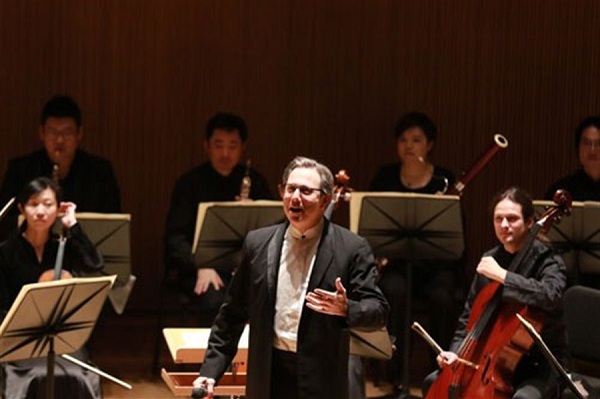
Conductor David Stern
American conductor David Stern, 52, is on a mission to share the joys of Baroque music with listeners in China. In fact, Stern was in town just a couple of weeks ago to direct the second Shanghai Baroque Festival, an event he helped found.
During the festival, Stern led a performance of Handel's "Alcina" with the Shanghai Symphony Orchestra and his own Opera Fuoco Ensamble.
"Music speaks in a way that no other art form can. It helps us become a better person, one who listens to others and communicates," says Stern.
Stern attributes his own passion for communicating through music to his famous father, violinist Isaac Stern.
The younger Stern's education at the Julliard School in New York focused mostly on Romantic music. He shifted to Baroque in the early 1990s when he began working as an assistant to British conductor John Eliot Gardiner. This opened the door to working with a number of orchestras on Baroque pieces. Eventually, he founded the Opera Fuoco, a Paris-based lyrical ensemble dedicated to music from the 18th and early 19th centuries.
Stern also has a lengthy personal relationship with China. He first visited in 1979 with his father, who came to the country on a cultural exchange. According to Stern, this trip helped cement his appreciation for music as a medium for cross-cultural interaction.
"My father didn't come to tell people what to do, but only to share what he loves most," he says. "Many Westerners complain about the difficulty in communicating with the Chinese. I always believe that if you come just as yourself and believe in what you are saying, the communication will happen regardless of the culture shocks. For me, bringing Baroque music to Shanghai is no different from bringing it to New York or Berlin. I love coming here, and I have a lot of good friends here. "
During his latest stay in Shanghai, Stern was kind enough to sit down with Shanghai Daily to rap about Baroque and China's growing appreciation for all things classical.
Q: Why are you so interested in Baroque music in particular?
A: Baroque music is the source of later music. These days, most students in China or the US learn Romantic music, but they don't study older styles like Baroque. It's like studying the last chapter, but you haven't read the first chapter.
I believe that learning about the beginnings of classic music will help people understand Romantic music differently. I love working in these repertoires.
So, when I was allowed to come and start the Baroque Festival here, I felt very proud to share what I love with Shanghai audiences. And it was just terrific that the audiences love it, too.
Q: In your opinion, why have listeners in Shanghai fallen in love with Baroque despite knowing little about it?
A: I don't know. But yes, the tickets all sell well. I think it's because Baroque music always tells a story, no matter if it's in an opera or just with instruments. It's very clear and very easy to listen to.
There is something very spiritual about Baroque music... The beauty of baroque music is more pure. And the way you play is not based on force. It's not about being loud, but what they call resonance. Resonance means that if you play in tune, the sound carries very far. It's not that you force it, but you hear the harmonies.
And I think that's what happened with Shanghai audiences. They felt it, and they fell in love with it. It's lovely.
Q: Some might say you're looking backward as a musician rather than forward. How would you feel about such comments?
A: I do modern music as well and I love it. But I think it's very difficult to understand "forward" if you never understand "backward." Actually, the more I go backward, the more I feel that musicians in the past knew more than we do today.
If you look at a Baroque music piece on the page, there are not many written instructions to follow. The notes are there, but many details like loud, short or long are absent — while these details were usually written clearly in Romantic pieces. So, when playing a Baroque piece, you have to interpret on your own how to make the music work. It's a challenge. You have more freedom with Baroque music than with Romantic music, but at the same time, you have to make independent choices. The composer only writes the outside of a shell, while you as the interpreter have to fill in the colors. That's a wonderful feeling.
Q: Jorg Demus, who visited Shanghai a few weeks ago, said that Chinese young people are becoming more open and sensitive to classical music. How do you see it?
A: This is what's happening in China. Some people say that it's because of the abundance of money used here, but I don't agree with them. It is not just about the money. It's true that the city puts a lot of money into building new halls, but it is also true that the public comes and cares.
I have been conducting in China regularly since 1979, and the public's understanding of classic music has grown so much. The sensitivity of the kids that I've worked with is amazing. They understand me in a second.
A lot of Westerns love to say that the Chinese only know about techniques, but don't feel the music. That is nonsense. They do feel.
There is so much happening in China in terms of infrastructure and musical sensitivity which is not happening in the West. There is a lot more excitement here. It's so wonderful to be a part of it.


















































